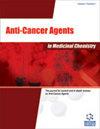Ionic Liquids Immobilized Synthesis of New Xanthenes Derivatives and their Antiproliferative, Molecular Docking, and Morphological Studies
IF 2.6
4区 医学
Q3 CHEMISTRY, MEDICINAL
Anti-cancer agents in medicinal chemistry
Pub Date : 2024-04-30
DOI:10.2174/0118715206299407240324110505
引用次数: 0
Abstract
Background:: Xanthenes and benzoxanthenesare are highly valuable compounds in organic chemistry and medicinal chemistry. Xanthene derivatives were found to have many applications in medicinal chemistry. Objective:: This work aims to explore the synthesis of xanthene derivatives with various substituents and find the possibility of their uses as anticancer agents. Method:: The basic starting compound through this work was the 2,3-dihydro-1H-xanthen-1-one (3), which was synthesized from the reaction of cyclohexan-1,3-dione and 2-hydroxybenzaldehyde. Compound 3 synthesized new thiophene, pyrimidine, isoxazole, and thiazole derivatives based on the xanthenes nucleus. Fused xanthene derivatives were obtained through further heterocyclization reactions. Multicomponent reactions expressed in this work were carried out in the presence of solvent catalyzed by Et3N and in solvent-free ionic liquid immobilized catalyst. Results:: Cytotoxicity for the newly synthesized compounds toward cancer cell lines was measured, and the results revealed that many compounds exhibited high inhibitions. Conclusion:: The antiproliferative activity of the synthesized compounds was studied on six selected cancer cell lines. The nature of the heterocyclic ring and the variations of substituted groups showed a high effect through the inhibitions of the tested compound.离子液体固定化合成新的氧杂蒽衍生物及其抗增殖、分子对接和形态学研究
背景::氧杂蒽和苯并氧杂蒽是有机化学和药物化学中非常有价值的化合物。研究发现,氧杂蒽衍生物在药物化学中有许多应用。研究目的本研究旨在探索具有不同取代基的氧杂蒽衍生物的合成,并发现其用作抗癌剂的可能性。方法:这项工作的基本起始化合物是 2,3-二氢-1H-氧杂蒽-1-酮(3),它是由环己-1,3-二酮和 2-羟基苯甲醛反应合成的。化合物 3 基于氧杂蒽核合成了新的噻吩、嘧啶、异噁唑和噻唑衍生物。通过进一步的杂环化反应,得到了融合的呫吨衍生物。本研究中的多组分反应是在溶剂存在的情况下,在 Et3N 催化下和在无溶剂离子液体固定催化剂中进行的。结果测定了新合成化合物对癌细胞株的细胞毒性,结果表明许多化合物具有很强的抑制作用。结论研究了合成化合物对六种选定癌细胞株的抗增殖活性。杂环的性质和取代基团的变化对测试化合物的抑制作用有很高的影响。
本文章由计算机程序翻译,如有差异,请以英文原文为准。
求助全文
约1分钟内获得全文
求助全文
来源期刊

Anti-cancer agents in medicinal chemistry
ONCOLOGY-CHEMISTRY, MEDICINAL
CiteScore
5.10
自引率
3.60%
发文量
323
审稿时长
4-8 weeks
期刊介绍:
Formerly: Current Medicinal Chemistry - Anti-Cancer Agents.
Anti-Cancer Agents in Medicinal Chemistry aims to cover all the latest and outstanding developments in medicinal chemistry and rational drug design for the discovery of anti-cancer agents.
Each issue contains a series of timely in-depth reviews and guest edited issues written by leaders in the field covering a range of current topics in cancer medicinal chemistry. The journal only considers high quality research papers for publication.
Anti-Cancer Agents in Medicinal Chemistry is an essential journal for every medicinal chemist who wishes to be kept informed and up-to-date with the latest and most important developments in cancer drug discovery.
 求助内容:
求助内容: 应助结果提醒方式:
应助结果提醒方式:


